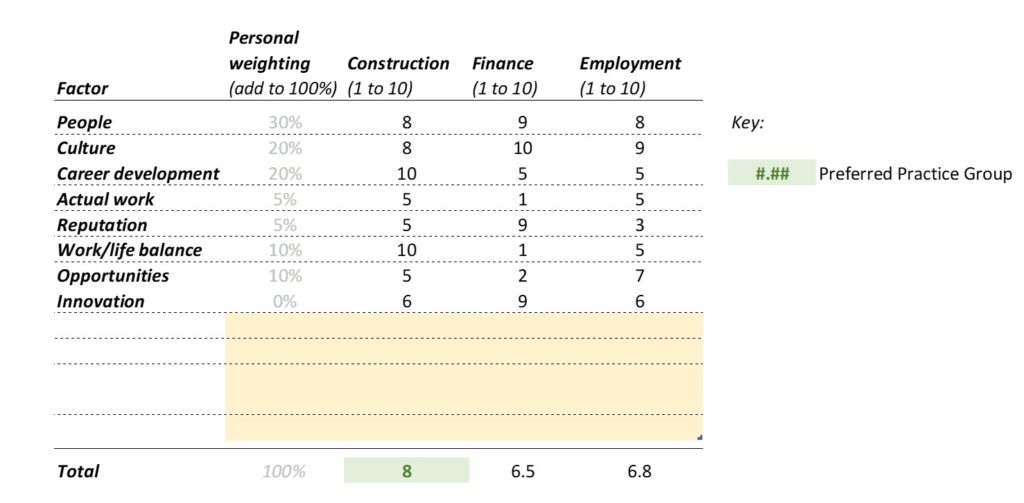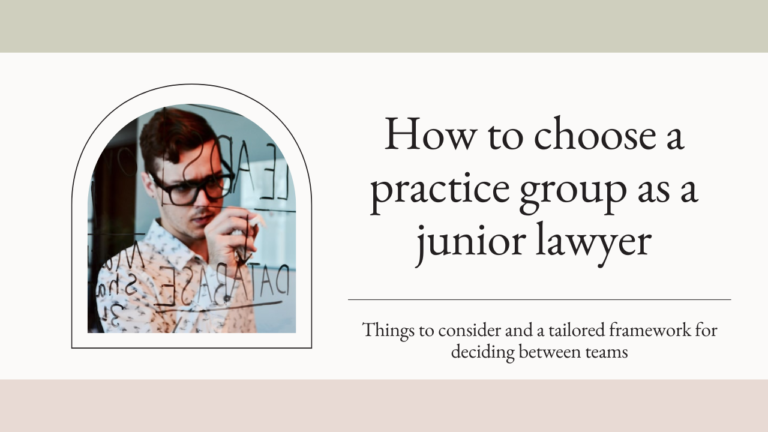Who is this for
- Graduates deciding which practice group to settle in after rotations
- Junior lawyers and law students weighing up different job opportunities
Introduction
Choosing a practice area and team is a big decision for many junior lawyers and law students.
When I started out, I was worried that I would make the wrong choice and end up in an area that I wasn’t interested in. Or worse, with a team that didn’t provide the support or lifestyle that I needed.
In case it’s helpful to anyone in a similar position, I started to put together a guide that:
- sets out factors to consider in choosing a practice area / team based on my research and interviews with current practising lawyers; and
- provides a simple framework for you to tailor weigh up their choices based on what’s important to you.
While I still think it’s best to trust your gut – (I never thought I’d end up as a construction lawyer!) – hopefully this helps you reach a decision if you’re still not sure.
Framework for choosing a Practice Group / Team
I’ve put together a simple framework to help you reach a decision on your preferred practice group or team.
It looks like this when you fill it in:

Here’s how you can tailor and use it yourself:
Step 1: Download the spreadsheet here:
Step 2: Insert additional ‘Factors’ that are important to you (if any)
Step 3: Insert the Practice Groups you are considering (e.g. construction, finance etc) in the top row.
Step 4: Insert percentage in the ‘Personal weighting’ column next to each Factor depending on how important that factor is to you:
- See the next section for guidance on what you can consider for each Factor.
- As an example, if career development is very important to you, it might be a 40% weighting.
- The total of the personal weightings should be 100%.
Step 5: Insert a score for each Factor in each Practice Group (1-10).
Step 6: The preferred practice group with the highest score will be highlighted green.
Note: Feel free to amend the numbers – this isn’t an exact science. Sometimes you flip a coin to choose between two options and realise what you actually want when the coin is mid-air.
Factors to consider
So what are the things you could consider when choosing between a practice area or team?
I’ve spoken to dozens of lawyers about how they reached their decision, and here are the main factors that popped up:
People
- Mentorship
- Do your colleagues provide honest feedback on your work? Do they tell you when you’ve done a good job as well as point out when your work isn’t up to standard?
- Do they give proper instructions? The type that gives you a clear idea of the task, timeframe and resources you should look at as a starting point.
- Do they teach you how to improve? This could be full review sessions for your work, or the patience to answer your questions when you’re not sure why they changed your draft.
- Do they care about your goals? Is this something they ask you about, and provide support for even if it’s different to their ones?
- Lifestyle
What are your colleagues’ lives like? And can you see yourself living like them?
Think about whether you prefer to work in teams that are more family-oriented or big partiers.
How stressed do they look? - Clients
Who are you working for in the end, and do you care?
Is it the ‘sophisticated’ corporate clients with the big budgets? Or the smaller companies / individuals that need more help?
Some people like working for big bankers and the hectic pace that comes with it. Others would hate it.
Culture
- Is the team collaborative or competitive? Some teams (and particularly partners) work well with each other, ask each other questions and are happy to share the legal work depending on expertise. Others take pride in being the best and would rather rely on their own experience to solve legal problems.
- Do they invest in their juniors or see them as labour? See how they talk about their past and present juniors. Do they have a good relationship or speak fondly about those who have left their team before?
- How long have people in the team been there for? If they’ve been there for a long time, then that might be an indication that the culture is good enough for people to want to stay.
Career development
- Are there people in the team that have been promoted from your position and have stayed? If there haven’t been, why not?
- How have people in the team developed their skills? Can you see a clear skill difference between people at different levels? Do they become more specialised or broaden their experience as they become more senior?
- How’s the training? There might be formal training programs in place. Or maybe the partners are more hands-on and work with juniors directly in producing work.
The actual work
- Are you interested in the actual subject matter? You might find learning about all the different types of defects that could occur in construction projects to be fascinating. Or you might find your eyes glaze over when people talk about how ponding on stairs means that the design wasn’t fit for purpose.
- Do you like the flow of the work? Generally, litigation and regulatory work is more consistent. Whereas transactional project-based work could have alternating periods of intense late nights and nothing going on.
- See what people in the team with 1 year, 3 years, 5 years, 10+ years of experience are doing. Can you picture yourself being interested in the type of work that they’re doing? See how much autonomy, responsibility, client contact, (and admin!) involved at different seniorities. Are they working in teams, with other practice groups, or as personal silos?
Reputation and track record
Is the team and/or the matters they work on highly rated? You could look at industry rankings, or see if the matters make the news.
Work/life balance
- What are the hours like? Do the people work late nights and weekends regularly? Do they take real holidays or work from the beach?
- What is the team’s attitude to billables? Some might be very strict and expect 100% billables at all times. Others understand that juniors need to take time to learn and that billable work isn’t within their control.
- Is there flexibility in the way they work? Some teams prefer everybody to be available in the same times. Others don’t mind how you allocate your time during the day as long as the work gets done.
- What about remote work? Work from the office, remote work, or hybrid – and does that work for you?
Opportunities
- Travel opportunities? You might value working in a transactional practice area (e.g. M&A) more because it’s easier to move internationally than for disputes.
- Secondments? Have people on the team been on secondments with clients and have they enjoyed them?
- Exits? It might be a bit early to factor this in, but maybe there are companies or an industry that you would like to work in future. If so, it’s a good idea to think about what sort of practice area experience they’re hiring for. I’ve also put together a list of the top employers and the legal backgrounds they’ve hired for here.
Innovation
Is this a team or sector that works on innovative opportunities? Do they even use computers?
Other
What else is important to you?
Things you can do to get more info
Many junior lawyers get an opportunity to do rotations before settling on a particular practice group. Or maybe you’ve worked at a few different legal environments during law school. Here’s a few other good ways you can get more information:
- Research:
- Never underestimate how much information is on google.
- Here’s a good guide that I’ve found handy before – https://hls.harvard.edu/ocs/career-research/practice-areas/
- We’ve also written articles with practical insights into what it’s like working in construction law and competition & consumer law.
- Virtual internships:
There are a range of free virtual internships for all sorts of law firms and practice areas available on https://www.theforage.com/ - Reach out:
- Don’t be afraid to reach out on alumni pages, social media (in particular LinkedIn), or your personal networks.
- Here’s a script that you can use:
Hi [insert], I hope you don’t mind me reaching out but I’m very interested in working in [competition & consumer law] and noticed that you’ve got an impressive career in this space. If you’ve got some time in the next few weeks, I’d love to connect (over a virtual or in person coffee) to learn more about your work. No worries if you’re too busy. Either way, hope you have a good week! - If they agree to meet, do some research beforehand (e.g. their work experience from LinkedIn, google their names to see if they’ve done an interview or published anything), and prepare some questions.
- After you meet – follow up. Not just to say ‘thanks for your time’. It’s always nice to hear if you ended up getting a job in that area or even later on:
“I really appreciated our chat – just wanted to give you an update that I’ve started working in [different legal area] but our discussion was really helpful in my decision.”
Final thoughts
Choosing a practice group is a big decision for junior lawyers and law students. Trust your instincts, but feel free to use something like the framework in this article to make your decision if you’re stuck.
Just remember, you’re not locking the rest of your career in at this stage. I’ve known private practice construction lawyers that switched to in-house employment lawyers. People starting out in generalist suburban law firms who became partners in BigLaw.
Your goals and preferences change over time, and so do the opportunities that come along.
Good luck!
